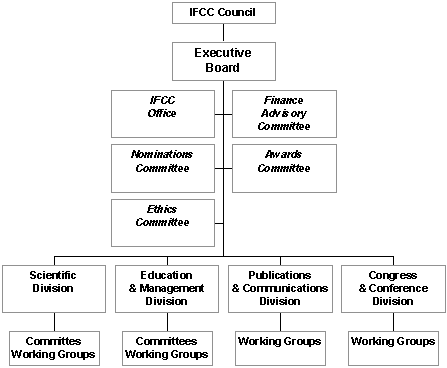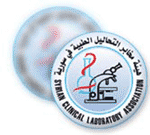| المجلد 3 , العدد 5 , شعبان 1425 - تشرين الأول (أكتوبر) 2004 |
| |
| الاتحاد الدولي للكيمياء السريرية والطب المخبري |
| International Federation of Clinical Chemistry
and Laboratory Medicine
|
| Dr. Renze Bais |
| IFCC Secretary |
The IFCC, the International Federation of Clinical Chemistry and Laboratory Medicine, has as its primary mission, to serve the public interest in healthcare by providing world-wide leadership in clinical laboratory science to national professional societies, the diagnostics industry, governments and non-governmental organisations. The Federation was founded on 24th July 1952 and celebrated its 50th anniversary in 2002 at the XVIII International Congress of Clinical Chemistry in Kyoto. The next Congress will be held in Orlando, Florida in July, 2005 at which more than 20,000 delegates are expected to attend. |
| Membership and Objectives |
The IFCC is a vibrant and highly respected international organisation that is now a federation of 79 Full Member national societies of clinical chemistry which together represent at least 30,000 clinical chemists worldwide. In addition, the Federation has 35 Corporate Members from the diagnostics and related industries which supply materials and services to laboratory medicine, and 4 Affiliate Members (check exact numbers WITH IFCC OFFICE) which are local professional societies with significant numbers of practising clinical chemists who do not have access to the IFCC through a national society Full Member. The Federation also establishes, and maintains contact with, individual clinical chemists in parts of the world where there is no professional body specifically concerned with clinical chemistry and laboratory medicine. There are five formally defined aims of the Federation. These are:
• to promote a vision of clinical chemistry and laboratory medicine that extends beyond traditional narrow perceptions of the field,
• to transcend the boundaries of a single nation, a single corporation, or a geographical, cultural or linguistic group of nations, in developing the field of clinical chemistry and laboratory medicine,
• to provide a forum for standardisation, in the broadest sense, at a high level,
• to disseminate information on ‘best practice’ at various levels of technology and of economic development,
• to complement and enhance the activities of its members.
It achieves its aims by publishing information and guidelines relating to the education of clinical chemists, by defining principles and publishing recommendations for the standardisation of analytical procedures and for the interpretation of analytical results. It enhances communication and personal professional development by promoting congresses, conferences and workshops in clinical chemistry and laboratory medicine, and by encouraging dialogue with clinicians on matters of common interest. More detailed information on the aims and objectives of the Federation, its statutes and rules, and all other matters, can be found on the IFCC web site, www.ifcc.org . |
| Organisational Structure and Operation |
|
The organisational structure for ensuring that the IFCC fully achieves its aims is based upon much of its business being carried out by Divisions and Committees, all of which are accountable (see diagram) to the Council of the Federation through an Executive Board. The Council is the governing body of the Federation and consists of one representative appointed by each Full Member, Affiliate Member and Corporate Member. Council meets at the triennial International Congress of Clinical Chemistry (ICCC), but between Council meetings, the business of the IFCC is conducted by an Executive Board elected by Council. Any important matters which arise between Council meetings are decided by mail ballot of the Full Member Representatives who vote on behalf of their societies.
There are currently four Divisions, namely Scientific, Education and Management, Communication and Publications, and Congress and Conferences, each of which may have Committees and/or Working Groups undertaking specific tasks or projects. All National Society Members and Corporate Members of the Federation may nominate candidates for the Divisions, Committees and Working Groups, but members are selected according to merit and expertise, irrespective of nationality or other affiliation. In addition to the Divisions, also reporting directly to the Executive Board are an Archives Committee and an Ethics Committee. |
 |
| Working with Other Organisations |
Over the years, the growth of the scientific reputation of the IFCC, particularly in the areas of standardisation and reference materials, together with recognition of the quality of its educational endeavours, have led to extensive cooperation with other international organisations. The earliest such relationship was with the International Union of Pure and Applied Chemistry (IUPAC) with whom formal reciprocal relations were maintained at Executive Board and Divisional level until two years ago in the year 2000. Throughout most of its history, the IFCC has also cooperated extensively with the World Health Organisation (WHO) and undertaken projects on its behalf, and has been helped by the WHO in carrying out some of its own projects.
In addition, the IFCC has actively sought to establish relevant contacts with both basic and applied sciences organisations to reduce unnecessary overlap of effort because of the proliferation of international scientific groups with special interests. There have been particularly productive contacts with the International Committee for Standardisation in Haematology (ICSH), the International Society for Thrombosis and Haemostasis (ISTH), the International Union of Biochemistry and Molecular Biology (IUBMB), the International Union of Immunological Societies (IUIS) and the World Association of Societies of Pathology and Laboratory Medicine (WASPaLM). An important demonstration, for example, of the usefulness of such collaboration was the ICSH, IFCC, WASP joint recommendation in 1972 on nomenclature in the presentation of results; and more recently (1999), the IFCC and WASPaLM have issued a joint statement on ‘Principles of Laboratory Accreditation’.
Other links of importance with non-governmental organisations include those with the International Organisation for Standardisation (ISO), the European Commission – Measurements and Testing Program, the International Organisation for Legal Metrology (OIML), the Council of International Organisations of Medical Sciences (CIOMS), the International Union of Physiological Sciences (IUPS) and the National Committee for Clinical Laboratory Standards (NCCLS). Recently the IFCC has been a leader in the formation of the Joint Committee on Traceability in Laboratory Medicine (JCTLM). The aim of the Joint Committee is to support world-wide comparability, reliability and equivalence of measurement results in Laboratory Medicine, for the purpose of improving health care and facilitating national and international trade in in vitro diagnostic devices. The IFCC is playing a key role in both the Working Groups one on Reference Materials and Reference Procedures and the other on the formation of a System of Reference Measurement Laboratories (see http://www.bipm.org/en/committees/jc/jctlm/). One important special relationship for the production of reference materials exists with the European Institute for Reference Materials and Methods (IRMM).
The IFCC also works with regional organisations such as the Arab Federation of Clinical Biochemistry (AFCB), the Federation of European Societies of Clinical Chemistry (FESCC), the Latin-American Confederation of Clinical Biochemistry (COLABIOCLI), and the Asian-Pacific Federation of Clinical Biochemistry (APFCB). The relationship between the IFCC and the four regional organisations is perhaps best described as symbiotic, because on the one hand, whilst the IFCC has assisted and encouraged these organisations in their contributions to local clinical chemistry, the membership of the IFCC has been increased through the regional activities. Examples of what the IFCC has provided the regional groups include the Visiting Lecturer Program and the running of a Masters Degree course in Clinical Laboratory Science at the University of La Plata in Argentina. |
| IFCC’S Divisions and Committees |
|
The main working activities of the IFCC are carried out through four Divisions: the Scientific Division, the Education and Management Division, the Congress and Conference Division and the Communication and Publications Division. The Scientific Division is the largest of the IFCC Divisions carrying out specific projects on its behalf. Much of the work of the Education Division is also carried out by Committees and Working Groups (currently 8 in all). During the 1990s the IFCC recognised the changing pattern of communication from printed text to an electronic form through the world-wide-web and took action to form the Communication and Publications Division whose role it is to coordinate communications and publications throughout the IFCC. This Division has been responsible for developing the IFCC Website and has initiated an ebookshop associated with the site.
The other aspect of communication, that involving the person-to-person element, is the responsibility of the Congress and Conference Division. Its work is primarily to oversee the organisation of all international congresses of clinical chemistry and to develop the IFCC General and Master Discussion conferences. The Division also supports and provides advice as needed to organisers of regional congresses.
In addition to the four Divisions, there are also two Standing Committees reporting directly to the Executive Board. One, the Ethics Committee was created in 2000/2001 so that our profession could respond to ethical issues raised by advances in genetics and the need for community education. |
| Corporate Member Support |
|
The excellence of the IFCC achievements is recognised - and has been for many years - by financial support from Corporate Members for a number of regular events. The most noteworthy are the sponsorship of Master Conferences by Roche Diagnostics and by the Beckman-Coulter company, together with the funding of five prestigious awards which are in the gift of the IFCC - the Distinguished Clinical Chemist Award and the Henry Wishinsky Award for Distinguished International Service both of which are sponsored by Bayer; the IFCC Award for Distinguished Contributions in Education sponsored by Beckman-Coulter; the IFCC Award for Significant Contributions in Molecular Diagnostics sponsored by Abbott, the IFCC-Roche Award for Significant Advances in Critical Care Testing; and the IFCC/EDMA Award for Evidence of Effectiveness of Laboratory Tests. The anniversary year recipients of these awards each received their award during the XVIII International Congress of Clinical Chemistry in Kyoto. |
| Conclusion |
The first 50 years of the IFCC has seen it make a significant contribution to improvements in laboratory medicine. However, the organisation is very aware of the challenges ahead, especially in developing countries and is working closely with many National and International organisations to continue its role in improving healthcare, throughout the World, in the 21st Century.
This summary of the activities of the IFCC has been largely taken from IFCC Celebrating 50 Years
written by John Lines and Jacques Heeren and published by the IFCC in 2002.
Further enquires regarding the organisation can be obtained by contacting the IFCC Office at
Via Carlo Farini 81
I-20159 Milano, Italy
Tel: +39 02 6680 9912
Fax: +39 02 6078 1846
Email: ifcc@ifcc.org
or on the Website at
www.ifcc.org
Prepared by Dr Renze Bais,
IFCC Secretary
Express Laboratory, Pacific Laboratory Medicine Services
Royal North Shore Hospital
St Leonards, Sydney, Australia 2065
Tel: +61 2 9926 7464
Fax: +61 2 9926 6069
Email: rbais@med.usyd.edu.au
|
| |
| المجلد 3 , العدد 5 , شعبان 1425 - تشرين الأول (أكتوبر) 2004 |
|
|
|
